Carl E. Olson's Blog, page 256
December 14, 2011
The Beginning of the Mystery (and the Nature of the Church's Mission)
Editor's note: The following essay is the second of two pieces by Fr. Schall on Pope Benedict XVI's historical visit to Germany in late September 2011. The first essay, "No Small Matter", reflected on what the Holy Father said in Germany about Martin Luther, sin, salvation, and the grace of God.
The Beginning of the Mystery (and the Nature of the Church's Mission) | Fr. James V. Schall, S.J.
"The Church's mission has its origins in the mystery of the triune God, in the mystery of the creative God, in the mystery of his creative love. And love is not just somehow within God, it is God, he himself is love by nature. And divine love does not want to exist only for itself, by nature it wants to point itself out. It has come down to humanity, to us, in a particular way through the incarnation and self-offering of God's Son: by virtue of the fact that Christ, the Son of God, as it were, stepped outside the framework of his divinity, took flesh and became man, not merely to confirm the world in its worldliness and to be its companion, leaving it to carry on just as it is, but in order to change it."
— Pope Benedict XVI, Concert Hall, Freiburg, Germany, September 25, 2011.
I.
Many reflections on Benedict XVI's third German visit are worth particular attention. Benedict is in his home turf in Germany. It is a place to which he hoped to return after his service to the Church in Rome after the death of John Paul II. Here I want to comment briefly on three of Benedict's addresses in Freiburg, one to the lay faithful, one to young people, and one to German Catholic leaders.
The pope recalls various "exposure programmes" in which groups of experts are sent to various countries in the world to report back on the conditions found there. Suppose that a similar group would come to Germany to find out what the religious condition of the country might be. What would they find? "They would find much to admire here, for example the prosperity, the order and the efficiency. But looking on with unprejudiced eyes, they would also see plenty of poverty, poverty in human relations and poverty in the religious sphere."
We live in an atmosphere of relativism. We notice that this relativism now becomes "aggressive" when it is suggested, against it, that the truth is possible and the "meaning of human life" can be found. The reason for this aggressiveness is because the denial or critique of relativism undermines the societal and personal justifications for lives based on it as if were beyond criticism about its very validity. The observers would notice the increasing influence of relativism. "It is reflected in the inconstancy and fragmentation of many people's lives and in the exaggerated individualism." How does this manifest itself in human lives? "Many no longer seem capable of any form of self-denial or of making a sacrifice for others." That is really a devastating consequence.
Besides Christian charity, our culture has had a tradition of "benevolence" or "altruism" which also seems to be dying. "People can hardly find the courage now to promise to be faithful for a whole lifetime; the courage to make decisions and say: now I belong to you, or to take a firm stand for fidelity and truthfulness and sincerely to seek a solution to their problems." When it is said that cultures first rot from inside, we sometimes wonder that it means. But the inability to make lifetime decisions is surely the heart of what it means.
The Pope also understands that the German Catholic Church has been very generous to many places in the world though its financial and technical support. On the surface, it might look like all is well. "The Church in Germany is superbly organized. But behind the structures, is there also a corresponding spiritual strength, the strength of faith in the living God?" We all know of the decline in religious attendance and belief in Germany and Europe. What is the problem? "The real crisis facing the Church in the western world is a crisis of faith. If we do not find a way of genuinely renewing our faith, all structural reforms will remain ineffective."
Many writers have wondered if the day of the large Church is over. What might be the alternative, at least in outline? People "need places where they can give voice to their inner longing. And here we are called to seek new paths of evangelization. Small communities could be one such path where friendships are lived and deepened in regular communal adoration before God." The ways the laws are going in many political society, it may well be that the Church will be legally and forcibly excluded from any direct contact with the civil order. The Pope's brief suggestion may be more important than we realize.
II.
Benedict, like John Paul II, is very good with audiences of young people. The Pope spoke to the young people at the Freiburg Trade Fair. He spoke of light. The relation of light, intelligence, and the good is an ancient theme, one mindful both of Plato and of the service of the Easter Vigil. Christ says that He is the Light of the world. It is from this light that we ourselves reflect a light that is not simply ours.
The Holy Father does not hesitate to tell the young men and women about what they face. He does not lie to them. "It is not our human efforts or the technical progress of our era that brings light into this world. Again and again we experience how our striving to bring about a better and more just world hits against its limits. Innocent suffering and the ultimate fact of death awaiting every single person are an impenetrable darkness which may perhaps, through fresh experience, be lit up for a moment… In the end, though a frightening darkness remains."
Yet, a light shineth in the darkness. Christ has "conquered death." No doubt, "those who believe in Jesus do not lead lives of perpetual sunshine, as though they could be spared suffering and hardship." Grace is still present. "Nobody can believe unless he is supported by the faith of others, and conversely through my faith, I help to strengthen others in their faith." The Pope in recent lectures has often stressed both the witness of saints and the relation of the faith of others to ours. We are not alone. If we believe in Christ, what He did, we can see that He is light. Yet, in spite of technical progress the "world in which we live does not seem to be getting better."
Almost every rejection of Christianity is proposed in its own terms, as a formula to make the world better by getting rid of the Christian influence. To this, Benedict responds: "Those figures in our history who saw themselves as 'bringers of light,' but without being fired by Christ, the one true light, did not manage to create an earthly paradise, but set up dictatorships and totalitarian systems, in which even the smallest spark of true humanity is choked." The consequences of unbelief are not neutral. "We cannot remain silent about the existence of evil." We see it in many places, including "in our own lives."
"Truly within our hearts there is a tendency toward evil, there is selfishness, envy, aggression. Perhaps with a certain self-discipline all this to some degree be controlled." Yet, many of our most unsettling problems are somewhat hidden to us, "sloth and laziness in doing good." What is even more sobering is this: "In history keen observers have pointed out that damage to the Church comes not from her opponents, but from uncommitted Christians." There is no doubt from our recent experience, the most damaging blows to the Church have come from within, self-inflicted, from unfaithful clergy and laity, from politicians who claim to be Catholic but make possible basic attacks on human life and dignity.
With all this sober commentary on our disorders, the Pope seems to be telling us that we need to straighten out our lives. And he does cite the word "repent." The Pope here reminds us, however, that Christ does not expect the members of the Church to sinless, a people with nothing to confess. God's presence in the Church is not directly dependent on the exemplary lives of its members. If it were, He would have departed long ago. The very structure of the Church uses sinful men.
Paul calls every baptized person a "saint." Children and every baptized person are already sanctified. It does not depend on our works. God "does not call you because you are good and perfect, but because he is good and he wants to make you his friends. You are the light of the world because Jesus is your light." This reflection of Benedict puts a new "light," as it were, on our weak and unbelieving souls in the Church. The Church does not cease to be the locus of light just because of its members who are unfaithful. It is just the opposite. As Peter said to Christ, "To where else should be go?" We are in the Church in part to rid ourselves of our sins.
III.
In the Freiburg Concert Hall, Benedict frankly told the German leaders: "For some time now we have been experiencing a decline in religious practice and we have been seeing substantial numbers of the baptized drifting away from church life." Benedict is a realist. So demands for change arise, changes almost always modeled on secular institutions and not on the sources of the original founding of the Church. Such radical changes would never work. The Church is of divine, not human law, in its essence.
Here, Benedict recalls that someone once asked Mother Teresa this same question about what needs to be changed in the Church. Her answer was "you and I." Chesterton was once asked a similar question. "What's wrong with the world?" He answered with wonderful brevity and profundity, "I am." Mother Teresa meant by this response that the Church is not "other people." "Every Christian and the whole community of the faithful are called to constant change," change away from sin, change to accept what is revealed, to accept what is true. What sort of change? "The fundamental motive for change is the apostolic mission of the disciples and the Church herself." Why is this? It is because ultimately this mission is not of our own making and arises from God's presence in the world.
The Church is to keep its mission in mind. Christians are told: "You are witnesses." They are not, at bottom, originators. They are to pass along what is heard, what is witnessed to every age and place. All nations, all times, and all places are in the original intention of the Church's founding. This means that we must not think as the world, for something less than what we are. The Church must be rather in a way "unworldly."
It is here where Benedict cites the passage that I placed at the beginning of these reflection. The Church's mission to the world does not begin in the Church herself or in the world. It begins in the inner life of the Trinity, in the original intention of creation. It begins in the fact that God is love and in the fact that love is, if it wills, outgoing. "Divine love does not wait to exist only for itself." The Second Person is "sent" into the world. This means that the world itself contains this sending. It is still present. Its end is its source, that is, to live eternal life.
"The Christ event included the inconceivable fact of what the Church Fathers call a sacrum convivium, an exchange between God and man." What might such an exchange include? It obviously implies that something reciprocal is here, not just one-sided. "The Fathers explain it in this way: We have nothing to give God; we have only our sin to place before him. And this he receives and makes his own, while in return he gives us himself and his glory, a truly unequal exchange, which is brought to completion in the life and passion of Christ." The return to the inner life of God thus comes through the life and passion of the Lord. "He becomes, as it were, a 'sinner,' he takes sin upon himself, takes what is ours and gives us what is his." The Church is the locus of this unequal exchange.
"The Church is immersed in the redeemer's outreach to men. When she is truly herself, she is always on the move." The Church is not allowed by God Himself to be satisfied, content that it has done enough. Moreover, if the Church is restrained or persecuted, it survives. "Secularizing trends—whether by expropriation of Church goods, or elimination of privileges or the like, have always meant a profound liberation of the Church from forms of worldliness, or in the process by which she, as it were, sets aside her worldly wealth and once again completely embraces her worldly poverty." When the Church is less worldly, she is usually more missionary; in that essential mission she reaches back to her Trinitarian origins.
The Pope concludes by returning to the idea that the faith is always about others, even when it is about ourselves. "Faith always includes as an essential element the fact that it is shared with others. No one can believe alone. We receive the faith—as Saint Paul tells us—'through hearing,' and hearing is part of being together, in spirit and in body. Only within the great assembly of believers of all times, who found Christ and were found by him, am I able to believe."
Ultimately we thank God for our belief, not our own genius. He first approaches us. Our approach to Him is always first a response to God in His providence. He alone can tell us who we finally are and that to which our souls tend, to that very inner life of the Trinity in which we are initially created by the free love of God. He sent His Son into the world "for us men and for our salvation." In the end, Benedict XVI told his countrymen the truth about ultimate things in a way no one else could. The image of a German scholarly Pope speaking about the truth of faith to the Germans is something this world has needed to witness all through the modern age. It is happening among us. We too can listen.
 Fr. James V. Schall, S.J., is Professor of Political Philosophy at Georgetown University.
Fr. James V. Schall, S.J., is Professor of Political Philosophy at Georgetown University.
He is the author of numerous books on social issues, spirituality, culture, and literature including Another Sort of Learning, Idylls and Rambles, A Student's Guide to Liberal Learning, The Life of the Mind (ISI, 2006), The Sum Total of Human Happiness (St. Augustine's Press, 2007), The Regensburg Lecture (St. Augustine's Press, 2007), and The Mind That Is Catholic: Philosophical and Political Essays (CUA, 2008). His most recent book from Ignatius Press is The Order of Things(Ignatius Press, 2007).
His new book, The Modern Age, is available from St. Augustine's Press. Read more of his essays on his website.
Trailer for "What to Do When Jesus Is Hungry", by Fr. Andrew Apostoli, C.F.R.
Also read an excerpt:
Here is more about the book:
What to Do When Jesus Is Hungry: A Practical Guide to the Works of Mercy
by Fr. Andrew Apostoli, C.F.R.
Related Products:
• What to Do When Jesus Is Hungry: A Practical Guide to the Works of Mercy -- Electronic Book Download
"The works of mercy provide us with the opportunity to let every person know he is a child of God and a brother in Christ. From the works of mercy will emerge a community of love and peace centered on Christ." -- Fr. Andrew Apostoli
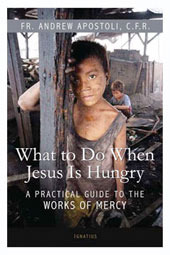
According to the Gospel of Matthew, Jesus will judge us on the basis of whether or not we fed him when he was hungry, gave him drink when he was thirsty, welcomed him when he was a stranger, clothed him when he was naked, and visited him when he was sick or in prison. What we have done for others, he will tell us, we have done for him.
The Catholic Church has traditionally called these six acts of kindness-along with a seventh, burying the dead -- the "Corporal Works of Mercy." In this down-to-earth yet inspiring guide, Father Andrew Apostoli, C.F.R., explains the Corporal Works of Mercy and illustrates multiple ways we can do them in our modern everyday life.
Father Apostoli also outlines the lesser-known but equally important "Spiritual Works of Mercy": counseling the doubtful, teaching the ignorant, admonishing the sinner, consoling the afflicted, forgiving offenses, bearing wrongs patiently, and praying for the living and the dead. And he offers many creative ways these too can be made part of our lives.
As a founding member of the Franciscan Friars of the Renewal, Father Apostoli knows firsthand about the challenges and rewards of caring for those in physical or spiritual need. His order is dedicated to the works of mercy, and Father Apostoli brings to his subject a great wealth of spiritual and practical wisdom gained from personal experience.
Fr. Andrew Apostoli, C.F.R., is a widely known and loved teacher and retreat master. A frequent presence on EWTN television, he is an expert on Our Lady of Fatima and Archbishop Fulton Sheen. He is the author of numerous articles and books, including Fatima for Today: The Urgent Marian Message of Hope (Ignatius, 2010).
"In Him, through His person, the healing and beneficial action of God is made present among us".
From Vatican Information Service:
VATICAN CITY, 14 DEC 2011 (VIS) - In his general audience this morning, the Holy Father dedicated his catechesis to Jesus' prayer in the context of His healing miracles, focusing particularly on the healing of the deaf man as narrated in the Gospel of St. Mark, and the raising of Lazarus.
The healing of the deaf man "demonstrates that the cures worked by Jesus were connected with the intensity of His relationships, both with others and with the Father", the Pope said. "With a gesture the Lord touches the sick man's ears and tongue; that is, the sites of his infirmity. ... But the central point of the episode lies in the fact that Jesus, at the very moment He works the cure, directly seeks His relationship with the Father", by looking up to heaven. "The narrative shows, then, that human involvement with the sick man led Jesus into prayer. His unique relationship with the Father emerges once again, His identity as Only-begotten Son. In Him, through His person, the healing and beneficial action of God is made present among us".
The raising of Lazarus also highlights this aspect of Jesus' dual relationships, His concern for a suffering friend and His filial bond with the Father. "His sincere affection for His friend ... is expressed by the fact that Jesus was deeply moved at the sight of the suffering of Martha and Mary, and of all Lazarus' friends, and in His profoundly human tears as he approaches the grave", the Pope explained. At the same time, Christ interprets His friend's death "in relation to His own identity and mission, and the glorification awaiting Him. When He hears news of Lazarus sickness, He says: 'this illness does not lead to death: rather it is for God's glory, so that the Son of God may be glorified through it'".
"The moment when Jesus prays directly to the Father before the tomb is the natural climax of the entire episode". According to John the Evangelist "Jesus looked upward and said, Father I thank you for having heard me". This phrase, Benedict XVI explained, "shows us that Jesus had not for a moment ceased His prayer for Lazarus' life. That prayer was continuous, indeed it strengthened Jesus' bond with His friend and, at the same time, confirmed His decision to remain in communion with the will of the Father, with His plan of love in which the sickness and death of Lazarus is the place in which the glory of God is made manifest".
Trusting in God's will
These episodes, said the Holy Father, help us to understand "that when we ask the Lord for something in prayer, we must not expect an immediate fulfilment of our requests, of our will; rather, we should entrust outsides to the will of the Father, reading events in the perspective of His glory, of His plan of love which is often a mystery to our eyes. Thus in our prayer, request, praise and thanksgiving should fuse together, even when it seems to us that God does not respond to our expectations. Abandoning ourselves to the love of God, which always precedes and accompanies us, is a fundamental principle in our dialogue with Him. ... Beyond anything that God may give us when we invoke Him, the greatest gift He can give us is His friendship, His presence, His love". The giver is more precious than the gift.
"The concern Jesus, true God and true man, feels for others, especially the needy and suffering, ... causes Him to turn to the Father. ... But the opposite is also true: communion with the Father, constant dialogue with Him, causes Jesus to be attentive to the real-life situations of man, to which He brings the consolation and love of God".
This profound bond between love for God and love for others must, the Pope concluded, also be part of our own prayers, which "open the door to God, teaching us how to abandon our own selves in order to come close to others, especially in moments of trial, bringing them consolation, hope and light".
At the end of his catechesis the Holy Father spoke in various languages to greet the more than 7,000 pilgrims gathered in the Paul VI Hall. He expressed his particular appreciation to the people who had contributed to the restoration of the sculpture of "The Resurrection" by Pericle Fazzini, which adorns the Hall. "Following a period of painstaking efforts", he said, "today we have the joy of being able to admire this work of art and faith in all its original splendour".
Speaking then in Spanish, Benedict XVI addressed a delegation from the Mexican state of Puebla, expressing the hope that, "with God's help, I will soon be able to visit you in your country".
An excerpt from "Fire of Love: A Historical Novel about Saint John of the Cross"

From "The Vocation of Fray Juan de Santo Matta" in Fire of Love: A Historical Novel about Saint John of the Cross | José Luis Olaizola | Ignatius Insight
On his way to his final retirement in Yuste, the emperor Charles V stopped in Medina del Campo. Here he stayed in the palace of Don Rodrigo de Duenas, founder of La Doctrina Cristiana. Don Rodrigo's palace, an exceptionally fine stone and brick house with a tower of homage and a Renaissance central courtyard, stood on the calle de Santiago, near the convent of La Magdalena.
As befitted a man who was about to retire from worldly affairs, the emperor had a small retinue, consisting of a handful of soldiers and men of letters. Among these was the Ethiopian Eusebio, formerly Gonzalo de Yepes' slave, who had now risen to the august position of amanuensis to the emperor's principal private 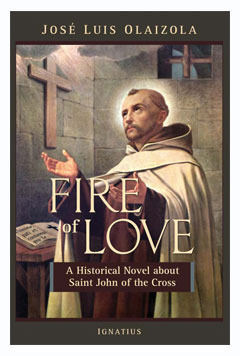 secretary. "Amanuensis" is something of a misnomer, as he had proved to be such an accomplished linguist that all court records were written by him, whether in Latin, Italian, French or Flemish.
secretary. "Amanuensis" is something of a misnomer, as he had proved to be such an accomplished linguist that all court records were written by him, whether in Latin, Italian, French or Flemish.
Eusebio Latino scoured Medina for the Yepes family, whom he had not forgotten. But he sent his letters to Fontiveros, thinking that they would still be living .there, working in his old master's beloved workshop. As a result, the letters went astray. The Yepes family was no longer what it had been under Don Hernando, who was dead. It was from servants of his eldest daughter that Eusebio learned the whereabouts of Catalina Alvarez. As it happened, she was living close by in the parish of Santiago. Their meeting was charged with emotion. On the one hand, Catalina said she owed all her happiness to the African, who had urged his master Gonzalo to be guided by the noblest prompting of his heart and marry the ward of the widow of La Morana. The African, meanwhile, enumerated the seemingly endless things Gonzalo had done for him.
"But of the many things he did for me," he said, "none was so great as to treat me as his friend. I have never forgotten the occasion on which he dismounted so that I might ride for a while on the horse. If I were to buy you the best house in Medina, it would not go even halfway to repaying you for this deed alone. But alas, I cannot afford such a thing, nor a fraction of it, for Don Gonzalo taught me to esteem honor above wealth, and so I do. But above all he wanted me to be a good Christian. And on this I gave him my word when I saw him for the last time, as he lay dying. And not for anything in this world would I forgo the joy of meeting him in the next. I have no money, but if there is any other way in which I can be of service to you, you have but to name it."
Catalina and Francisco said that to hear him speak about Gonzalo in these terms was more than enough. The African persisted, however, and at last Francisco admitted that the amount of work coming into the workshop could easily be done by his mother and his wife and that he had been trying to find a position in a large house but without success. It did not take Eusebio long to spread the word among the people visiting the palace where the emperor was staying. A few days later, Francisco was taken on as a squire by two noblewomen living on the calle de Santiago.
During the Emperor's two-week stay in Medina, Eusebio visited Catalina every day. As soon as he heard about Juan and his growing reputation, Eusebio went to see him at the Jesuit college.
20% off New Books and Films from Ignatius Press, through Dec. 20th

20% off New Books and Films
Offer ends Tuesday December 20th, 2011 at 12:00 midnight EST.
These prices are available online only through Ignatius.com
Now available for purchase are the 2nd editions of the Adoremus Hymnal, they have been revised to incorporate the new English translation of the Mass. To read more about these new editions, visit the website here. Also available are new books and DVDs. From the wonderful new films on Saint Philip Neri and Blessed Duns Scotus to the documentaries on The Way of Saint James and the life of Archbishop Fulton Sheen, we have some great products at great prices!
The Adoremus Hymnal, first published in 1997, has been revised to incorporate the new English translation of the Mass. The new edition also includes new musical settings of the Mass, as well as additional hymns and chants. Like the original edition, the hymnal is intended for use both in small parishes with few musical resources and in large parishes with full choirs.
 Adoremus Hymnal: Standard Edition, 2nd Edition
Adoremus Hymnal: Standard Edition, 2nd Edition
The Standard Edition includes the Order of Mass in Latin and English (including basic chant) Musical settings of the Latin chant Ordinaries (in neumes) Musical settings of the English Ordinaries (modern notation) Hymn collection with complete harmonization (for congregation and choir) Benediction service Index of Ordinaries Index of hymns by first lines Index by liturgical season or occasion.
 Adoremus Hymnal: Melody Edition, 2nd Edition
Adoremus Hymnal: Melody Edition, 2nd Edition
The Melody Edition includes the same as listed in the Standard Edition above, but melody-only for hymns, and only the three basic indices.
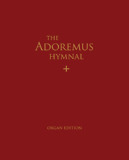 Adoremus Hymnal: Organist Edition, 2nd Edition
Adoremus Hymnal: Organist Edition, 2nd Edition
The Organist Edition includes all music (no Mass texts) in modern notation, especially arranged for organ accompaniment of Mass settings and hymns, in a special binder with larger pages than the original edition. The organ version includes all the indices in the standard version.
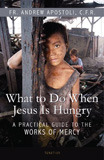 What to Do When Jesus is Hungry
What to Do When Jesus is Hungry
A Practical Guide to the Works of Mercy
Fr. Andrew Apostoli, C.F.R.
According to the Gospel of Matthew, Jesus will judge us on the basis of whether or not we fed him when he was hungry, gave him drink when he was thirsty, welcomed him when he was a stranger, clothed him when he was naked, and visited him when he was sick or in prison. What we have done for others, he will tell us, we have done for him.
The Catholic Church has traditionally called these six acts of kindness-along with a seventh, burying the dead -- the "Corporal Works of Mercy." In this down-to-earth yet inspiring guide, Father Andrew Apostoli, C.F.R., explains the Corporal Works of Mercy and illustrates multiple ways we can do them in our modern everyday life.
Watch the trailer for What to Do When Jesus is Hungry by clicking here.
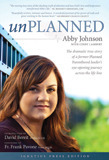 Unplanned - Now Available in Paperback
Unplanned - Now Available in Paperback
The Dramatic True Story of a Former Planned Parenthood Leader's Eye-Opening Journey Across the Life Line
Abby Johnson
Abby Johnson quit her job in October 2009. That simple act became a national news story because Abby was the director of a Planned Parenthood clinic in Texas who, after participating in her first actual abortion procedure, walked across the road to join the Coalition for Life. Unplanned is a heart stopping personal drama of life-and-death encounters, a courtroom battle, and spiritual transformation that speaks hope and compassion into the political controversy that surrounds this issue.
 The Song at the Scaffold
The Song at the Scaffold
A Novel
Gertrud von le Fort
The story unfolds around the fictional character of Blanche de la Force, an excessively fearful aristocrat who enters the Carmelite convent in order to flee the dangers of the world. As the Reign of Terror begins, Blanche is no safer in the convent than in the streets of Paris, and some of the sisters begin to doubt her ability to endure persecution and possibly martyrdom. The fates of Blanche and the other Carmelites take several unexpected turns, leaving the reader with an inspiring witness not only of martyrdom but of God's power being glorified in human weakness.
DVDs
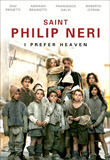 Saint Philip Neri
Saint Philip Neri
I Prefer Heaven
An epic feature film on the famous "Apostle of Rome" and great friend of youth in the 16th century. One of the most popular saints of all time, St. Philip Neri was widely known for his great charity, deep prayer life, and tremendous humor. This captivating film highlights Neri's great love for youth, his warm sense of humor, contagious joy, deep mystical spirituality, and his amazing gift for miracles.
[image error]Blessed Duns Scotus
Defender of the Immaculate Conception
The inspiring true story of the holy Franciscan priest and theologian who won a famous debate against the Dominicans in the 13th century in which he defended Our Lady's great privilege of her Immaculate Conception, laying the groundwork for the Church to later define that as a dogma of the Catholic faith. Filmed in beautiful ancient monastery locations in Europe, Scotus is revealed as a humble and courageous apostle of the Faith against the oppressive anti-Catholic government in power. His public defense of the papacy as the head of the Church eventually got him thrown out of the country.
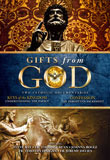 Gifts From God
Gifts From God
The Papacy and Confession
This new DVD has two excellent documentary films, one on the papacy titled Keys of the Kingdom: Understanding the Papacy, and the other titled Confession: The Forgotten Sacrament. Both films feature expert priests and theologians presenting in-depth commentary on these two sublime spiritual gifts from God to humanity through the Church, revealing the powerful spiritual significance of the papacy and confession for Catholics.
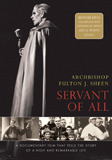 Archbishop Fulton Sheen
Archbishop Fulton Sheen
Servant of All
This special double DVD film package includes an acclaimed new film on the great Archbishop Fulton Sheen, Servant of All, along with five of his most popular television programs from his #1 rated TV series, Life is Worth Living. This powerful film Servant of All introduces the beloved Archbishop to a new generation that greatly needs his inspiring example of love for God and neighbor. It reveals how the impact of Sheen's prolific life and works continue on in those whose lives he forever changed.
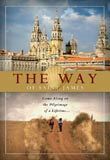 The Way of Saint James
The Way of Saint James
Over the lovely "Camino de Santiago", the Way of St. James, which is the ancient route leading from the Pyrenees to the famous and ancient shrine of Santiago de Compostela, this documentary follows the journey of several pilgrims who differ in culture and religious faith, united only by a mysterious attraction towards the same spiritual destination.
For Additional Sale Items Click HERE!
Items are not sold on approval.
Periodically we make available -- only to you, our valued repeat customers -- special offers which are not available to the general public. We offer these discounted prices as our gift to those who help us by using Ignatius.com. Please do not ask for retroactive price consideration. We cannot accommodate those requests. Many thanks.
"People who know St. John of the Cross only superficially..."
... may consider his spirituality to be predominantly negative. That there is a prominent sacrificial element is true, just as there is in the Gospel. But what is not sufficiently understood is that in both John and the Gospel the negative is never sought for itself, and that the positive overwhelmingly predominates. That this is so we will consider in its proper place, but it may be well to note here that this man had an exceptionally affirmative, optimistic vision of both the human person and the divine plan. Even his nada doctrine was entirely aimed at reaching an enthralling immersion in God. The sanjuanist optimism can be seen, for example, in his portrayal of all creation as a resplendent bride given by the Father to the Son: "I will hold her in My arms 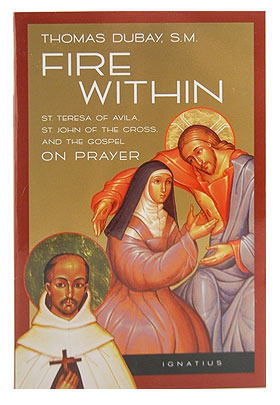 and she will burn with Your love, and with eternal delight she will exalt Your goodness .... By these words the world was created, a palace for the bride." It would be difficult to find in all of literature a more jubilant, a more positively ecstatic outlook on creation and the human person within it. The critics of John seem not to read this far or else not to absorb what he says. Optimism is found everywhere in the saint's writings, even in the most stark sections on detachment and self-denial. Always he invites the reader to an entire enthrallment, an abiding joy beyond imagining.
and she will burn with Your love, and with eternal delight she will exalt Your goodness .... By these words the world was created, a palace for the bride." It would be difficult to find in all of literature a more jubilant, a more positively ecstatic outlook on creation and the human person within it. The critics of John seem not to read this far or else not to absorb what he says. Optimism is found everywhere in the saint's writings, even in the most stark sections on detachment and self-denial. Always he invites the reader to an entire enthrallment, an abiding joy beyond imagining.
St. John of the Cross did not seem to excel in speaking to large groups of people with the effectiveness of a John Chrysostom or a Francis of Assisi, but he did have a powerful gift for relating to individuals and small groups in informal chats. Peers tells us that while he could easily be missed and passed over in a crowd, "once seen and spoken to alone, [he] could never be forgotten". This charism, together with his uncommon grasp of the interior life, readily explains his popularity as a spiritual director. He was much sought after in this capacity by all sorts of people: laymen and laywomen, nuns, university students and their professors. His insights into Scripture were so well known and appreciated that professors at the university in Baeza consulted him to learn of these "new" explanations of the biblical word.
On the natural level it appears that John's greatest talent was his poetic genius. The Spanish scholars I have met and read are agreed that he is probably the greatest poet in the Spanish language. Kavanaugh and Rodriguez write that the saint is known as "the loftiest poet of Spain", not because of volumes upon volumes of verse but because of a mere handful often to twelve compositions. They add that "these compositions, however, display such variety that it can almost be affirmed that each of them represents a completely distinct poetic vision and technique, a singular accomplishment in Spanish literature". ...
However, as is the case with any man or woman, the most important thing about St. John of the Cross was not what he did but what he was. Sheer sanctity was his paramount trait. This man was on fire, utterly absorbed in God. He experienced ecstatic prayer even though he said almost nothing about the subject (because "Madre Teresa" had already so well said all that needed to be said about it), and he reached the transforming union while still a young man. The saint was capable of an absorption during meals such that he could not recall what he had eaten-much like St. Thomas Aquinas, who provided his own anesthetic for bleeding by the simple procedure of going into contemplative prayer.
As we would expect, John's transformation into the divine (understood, of course, in a nonpantheistic sense) showed itself in his active caring for others. The dire poverty of the nuns at the Incarnation convent while he was their confessor so touched his heart that he went out to beg alms for them, and he made a point of seeking delicacies for the ill. When his own friars were sick, the saint gave them exquisite care. If one of them had no appetite, John would suggest kinds of food he might like and then procure them immediately. He would rise at night to check on the welfare of an ill confrere even when another friar had volunteered or been appointed to watch at the bedside. We know that he had a special love for the nuns at Beas, and he showed it at least once by walking several miles out of the way to visit them. This affection appears likewise in letters addressed to them. In one he remarks how they will know from his coming visit that he has by no means forgotten them, and he refers to "the beautiful steps you are making in Christ, whose brides are His delight and crown". Further on he speaks to them as "my beloved daughters in Christ", and in another he assures them that their letter to him was a great comfort. In still another he strives to lighten the burden of pain in one of these Beas nuns: "Do not think, daughter in Christ, that I have ceased to grieve for you in your trials and for the others who share in them."
Read more:

For more by the late Fr. Dubay about St. John of the Cross, listen to the audio of his EWTN series on the great Saint and Doctor.
December 13, 2011
"In the church of Kathleen Sebelius,..."
... there is little room for dissent. "We are in a war," the Health and Human Services Secretary declared to cheers at a recent NARAL Pro-Choice America fund-raiser. Give the lady her due: Her actions mostly match her words.
Mrs. Sebelius's militancy explains the shock her allies are now feeling after last Wednesday's decision to overrule the Food and Drug Administration on Plan B, a morning-after pill. The FDA had proposed allowing over-the-counter sales, which would give girls as young as 11 or 12 access without either a prescription or a parent. Now the secretary's allies are howling about her "caving in" to the Catholic bishops.
On this score they needn't worry.
And:
Whether you approve or disapprove of contraception or sterilization is beside the point. Today nine out of 10 employer plans offer what Mrs. Sebelius wants them to. The point is whether it is right or necessary for Mrs. Sebelius to use the federal government to bring the other 10% to heel.
There was a day when liberals and libertarians appreciated the importance of upholding the freedoms of people and groups with unpopular views. No longer. As government expands, religious liberty is reduced to a special "exemption" and concerns about government coercion are dismissed, in the memorable words of Nancy Pelosi, as "this conscience thing."
Read the entire essay, "The Church of Kathleen Sebelius", by William McGurn, in today's edition of the Wall Street Journal. It's not a surprise that Sebelius or Pelosi occasionally do the right thing or end up being in line with Catholic doctrine. After all, it's not as if dissent or heresy are defined by getting everything wrong; rather, the two women are gravely wrong about certain things, and especially about core, fundamental truths, such as the inherent dignity and value of life, which begins at conception. And both of them get many such things wrong. So, now what?
Related:
• Foggy Controversies, Empty Protests, and Faux Freedom (CWR blog, Oct. 13, 2011)
December 12, 2011
"Ex corde Ecclesiae" twenty years in: the news is not good
And, sadly, that is not surprising. From the Cardinal Newman Society blog:
A national survey of U.S. Catholic college presidents reveals significant gaps in the implementation of Ex corde Ecclesiae more than 20 years after the Vatican issued its apostolic constitution for Catholic higher education.
The survey results are presented in "Ex Corde Ecclesiae and Catholic Higher Education," a doctoral dissertation by James Caridi, vice president for student development at Ohio Dominican University in Columbus, Ohio. About half the presidents of the nation's 217 Catholic colleges and universities responded to Caridi's survey in the spring of 2011.
The study's release comes just as the U.S. bishops are wrapping up a review of the implementation of Ex corde Ecclesiae, the 1990 Vatican constitution that defines and sets requirements for Catholic colleges and universities worldwide. The U.S. bishops' "application" of Ex corde Ecclesiae, including guidelines specific to American Catholic institutions, has been in effect since 2001. ...
Caridi's dissertation is generally positive about the results of his survey, finding that Catholic college presidents generally support Ex corde Ecclesiae and believe they are meeting its requirements. But many presidents also acknowledge that their institutions have not complied with the constitution.
For instance, although Ex corde Ecclesiae describes theology as essential to the Catholic university, 42 percent of the presidents of U.S. institutions report having neither a department nor a chair of Catholic theology as required by the constitution. More than seven percent say that Catholic theology is not even taught in their institutions.
The Vatican also requires each professor of Catholic theology to have a mandatum from the local bishop—an affirmation that the professor embraces and intends to teach authentic Catholic doctrine. Whereas some Catholic colleges consider the mandatum to be necessary for hiring as a Catholic theologian, most refuse to reveal or even track who has the mandatum. According to the survey, 36 percent of Catholic college presidents said they don't know whether their theology professors have the mandatum, 10 percent said some but not all of their theologians have it, and another 6 percent said no faculty have it.
Read the entire piece. And here are some related Ignatius Insight essays:
• Courageous Creativity, Rigorous Fidelity, and Ex Corde Ecclesiae: Reflections of a Student in An Age of Dissent | Brian Jones, with Marcus Toft
• Is Gonzaga still a Jesuit, Catholic university? The ruminations of a bewildered witness | Dr. Eric Cunningham
• "The Transcendent Dimensions of Study and Teaching": The Pope on the Purpose of Education | Fr. James V. Schall, S.J.
• The Molochs of Modernity | Dr. Jose Yulo
• Ratzinger and Regensburg: On What Is a University? | Fr. James V. Schall, S.J.
• Ivory Comedy Clubs: The Tragedy of Modern Education | Dr. Jose Yulo
• On Learning and Education | An Interview with Fr. James V. Schall, S.J.
• Reading Without Learning: On Not Missing "Sublime Passages" | Fr. James V. Schall, S.J.
• The Inequalities of Equality, or All Things Being Equal, Not Everything Can Be Equal | Fr. James V. Schall, S.J.
• On School and Things That Are Not Fair | Fr. James V. Schall, S.J.
• On Teaching the Important Things | Fr. James V. Schall, S.J.
The path from legal to "normal" to "moral" to deep cultural problems
National Catholic Register talks with Fr. Robert Spitzer, S.J., about his new book, Ten Universal Principles: A Brief Philosophy of the Life Issues:
The book is a wake-up call for the whole culture, to avoid what you describe as "widespread abuse of human beings and a general decline in culture." Obviously, abortion is a leading indicator of this decline. How has it caused a decline in our culture?
What becomes legal becomes normal, and because it is legally sanctioned, what becomes normal becomes moral. And
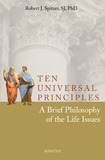 that is a problem. Legal sanction leads to normality. Normality leads to some sort of moral sanction — everybody is doing it. So what we have is a general cultural problem.
that is a problem. Legal sanction leads to normality. Normality leads to some sort of moral sanction — everybody is doing it. So what we have is a general cultural problem.
So I took the 10 principles that ground any healthy civilization and I said: "Here is what civilization rests on and has always rested on." People know that if you give up objective truth then we are left with the strongest will or influential will, or whoever can get the most money mustered for a campaign win. Might makes right. Anytime you have these 10 principles undermined you have very deep cultural problems.
More than once you call for the overturning of Roe v. Wade in the book, based on these 10 sound principles. Do you think we are getting anywhere close to that possibility?
It is my understanding from friends in the legal establishment … that most judges do not think that Roe v. Wade is good law and the ones who do think so are not that smart. Our judges are seeing a problem with the law. But they like the policy behind the law. So there is an advantage and a disadvantage right now. More and more people see abortion as wrong. One of the key things in the case against abortion is interuterine photography. These are exceedingly good cameras. You are looking right at your baby. It's hard to say this is not a human being. So technology is in our favor. It is pushing back viability. It is now at 26 weeks, I believe.
So law and science are working for us, but one missing leg in this three-legged stool is education. I think lawyers are getting antsy, and technology is in our favor, but we are not doing the educational job yet. Our educators are not aware of the 10 principles. I wanted to write a book that would bring all of these things together in a sort of subtle way — the law, the science and the need for greater education on the life principles.
Read the entire interview, conducted by Fr. Matthew T. Gamber, S.J.
Ten Universal Principles: A Brief Philosophy of the Life Issues is also availabe in e-book format.
Pope plans to visit Cuba and Mexico in early 2012
From an AP report:
(AP) VATICAN CITY — Pope Benedict XVI plans to travel to Cuba and Mexico before Easter next year, saying he hopes his visit will strengthen the faith and encourage Catholics there to seek justice and hope.
Benedict confirmed his travel plans Monday during a Mass in St. Peter's Basilica honoring Mexico's patron saint, the Virgin of Guadalupe.
The late Pope John Paul II made historic trips to both Cuba and Mexico. He became the first pope to visit Mexico when he landed in 1979 on his first foreign trip and he made a groundbreaking tour of communist Cuba in 1998.
Benedict has visited Latin America once before — Brazil in 2007 — but the 84-year-old has focused his travel mostly in Europe, to both spare him from long trips and to focus his efforts on a continent where Christianity has fallen by the wayside.
Carl E. Olson's Blog
- Carl E. Olson's profile
- 20 followers




